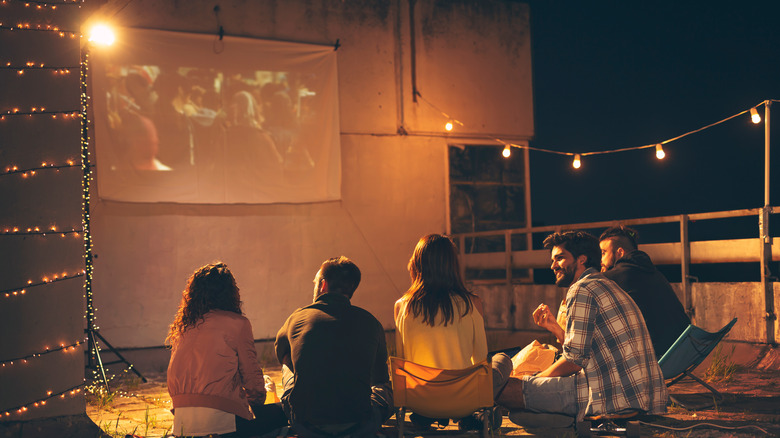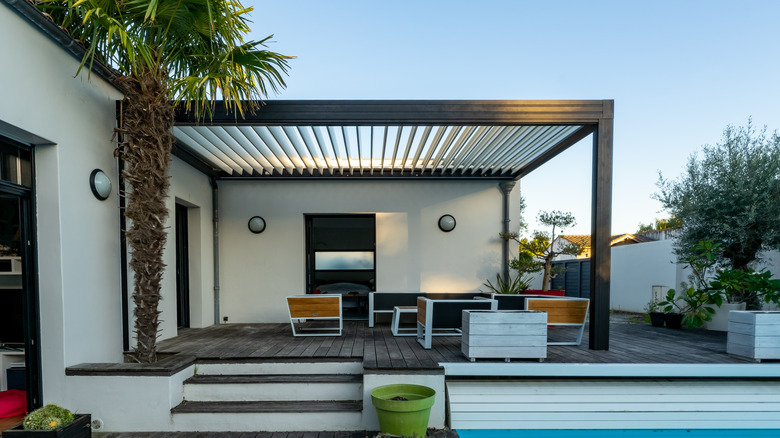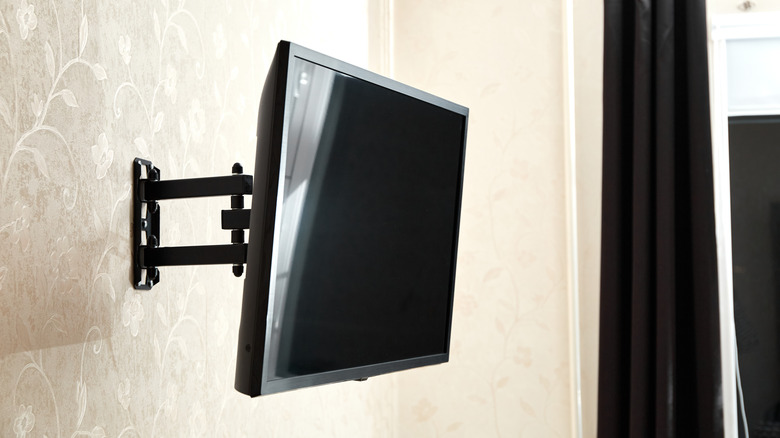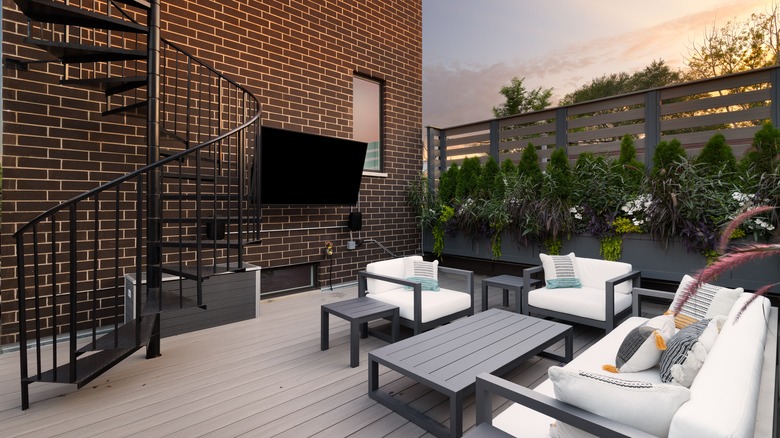5 Things To Know Before Hanging A TV Outside
As a way to create an outdoor space that extends beyond the four walls of the home, homeowners often want to make their patios and backyards even more inviting. Adding a television to your exterior space is a great way to amplify relaxation and host parties and other gatherings with friends. TVs provide that essential ingredient for watching sporting events, facilitating modern game nights, and much more. Installing an outdoor television can provide just the right mix of familiar entertainment value with the immensely powerful atmosphere of the great outdoors.
Coldwell Banker notes that coziness is a key feature of any outdoor living space. Bringing some of the trappings of indoor living along with ambient lighting options can make for a wonderful retreat from the mundaneness of everyday life. Outside, there's something new going on around you at all times, helping to melt away the stress of the day with ease. A TV can complete the scene, making for a more versatile living space in this outdoor setting.
Due to some obvious reasons and other constraints, mounting a television outside the home isn't as simple as an indoor setup. We've compiled five key features of installation to keep in mind, so you can kickstart a new outdoor lifestyle with ease while eliminating the common headaches that often arise.
Install outdoor televisions in the shade
When installing a television outside, it's best to position the screen under a shaded area. This is beneficial for a number of reasons. First of all, shaded areas will ensure better overall performance of the equipment. Wires, cable boxes, and the TV itself will work better if they are protected from moisture, wind, and other weather issues.
Another reason to place a TV beneath a covering like an awning, roof, or permanent umbrella, is to ensure that the screen is always providing maximum visibility for viewers. The New York Times' Wirecutter notes that TVs operating outside need to be set for considerable brightness to combat the glare of the sun. The natural brightness of the exterior setting can easily bleach out the picture on your TV. Placing the screen beneath a natural element of shade (or creating something new) gives your screen the chance it needs to cut through the prevailing brightness and deliver an outstanding entertainment experience, regardless of the weather.
Specialized exterior mounting equipment is necessary
Determining how you will keep the TV in its position is also important. Regardless of the type of television you are planning to install on the back porch or near the pool, specialized mounting equipment or other TV stand amenities are required. Mount-It! notes that exterior spaces see far greater temperature fluctuations and are influenced by a range of weather conditions that indoor gear will never have to withstand. As a result, an indoor TV mount simply won't pass muster when it comes to positioning your screen outside.
Exterior equipment is purpose-built for mounting or setting a TV in this environment, and will provide you with the best quality over the long term. Similarly, you might want to consider using protective equipment to enclose the screen if you live in a particularly rainy environment. This casing will ensure that the expensive screen is never at risk of breakage due to increased contact with moisture.
Rotate what you already have
If the expense of an outdoor-specific television goes beyond your budget, you might want to consider simply rotating televisions instead. This is a great way to get extra use and value out of a TV that's still working but may be in need of a replacement. Reviewed notes that repurposing a TV is one of the best ways to ensure that it doesn't end up as electronic waste, sitting idly in a landfill while the high tech components potentially create long term environmental hazards.
Rotating your TVs is as simple as focusing on the most watched screen in the home. Buying a new screen to upgrade that one will free up a screen for use outside. Simply rotate each TV down the pecking order, or reevaluate the order with the introduction of a new viewing space outside. When you're ready to get rid of the oldest television in the house, donate or recycle it properly, in order to make sure that each electronic device in your home is disposed of in the safest way possible.
Consider the unique sound needs of outdoor entertainment
Homeowners in the process of creating outdoor entertainment spaces may already be thinking of exterior speakers as well. However, it's not always apparent that a TV will require additional sound considerations. Your TV might come fully loaded with high quality speakers, however, it's worth inspecting the current capabilities to ensure it can perform in the open environment of your back porch or elsewhere.
Outside, sound travels differently than in an enclosed space. This means that you may need to install specialized, directional speakers, or consider built-in surround sound additions around the entertainment area. The TV Shield notes that sound quality can differ once the TV is placed outside as well. This means that even if your unit can produce the amount of volume required to enjoy movies, sports, and more in the exterior space of your choosing, the timbre of that sound might not be very pleasant.
Plan ahead for cable and accessory protection
It's important to think about protective additions for your cables and plug-in accessories. A Chromecast, Apple TV installation, Fire Stick, or any other additional elements that are required to link the TV to video sources will also need to be considered when placing the unit outside. Cables and connections are susceptible to wind, rain, and even pest issues if they aren't properly looked after.
One great way to care for your cables and accessories is to simply take steps to hide them away (with some customizations for your personal circumstances, of course). Backyard Scape notes that hiding external wiring is a great way to beautify the space and keep long segments out of the way of routine movement. Wires that dangle or run across the ground can become tripping hazards and potentially even pull heavy units off the wall, damaging objects or harming people in the process. Hiding your wires and insulating them from the elements is essential to placing the finishing touches on this project.





